
While you can easily access your email on your web browser, some of us rely on desktop email clients for checking our emails.
But, why do you need to try desktop email clients at all? If you do, what are your best options?
Here, we list the best email clients available for the Linux platform. Furthermore, I tell you what you need to keep in mind to pick a good email client.
Reasons You Need a Desktop Email Client
Yes, you are not alone when you wonder — why do I need a desktop app if I can do it through the web browser?
Here are some benefits to a native email client experience:
- Quick offline access
- A way to access multiple email inboxes from different providers
- Notifications or any other integrations with the desktop
- Comfortable user interface / easy to organize emails
- Security features
- Customizability for the look/feel and functionality in terms of plugins
1. Thunderbird
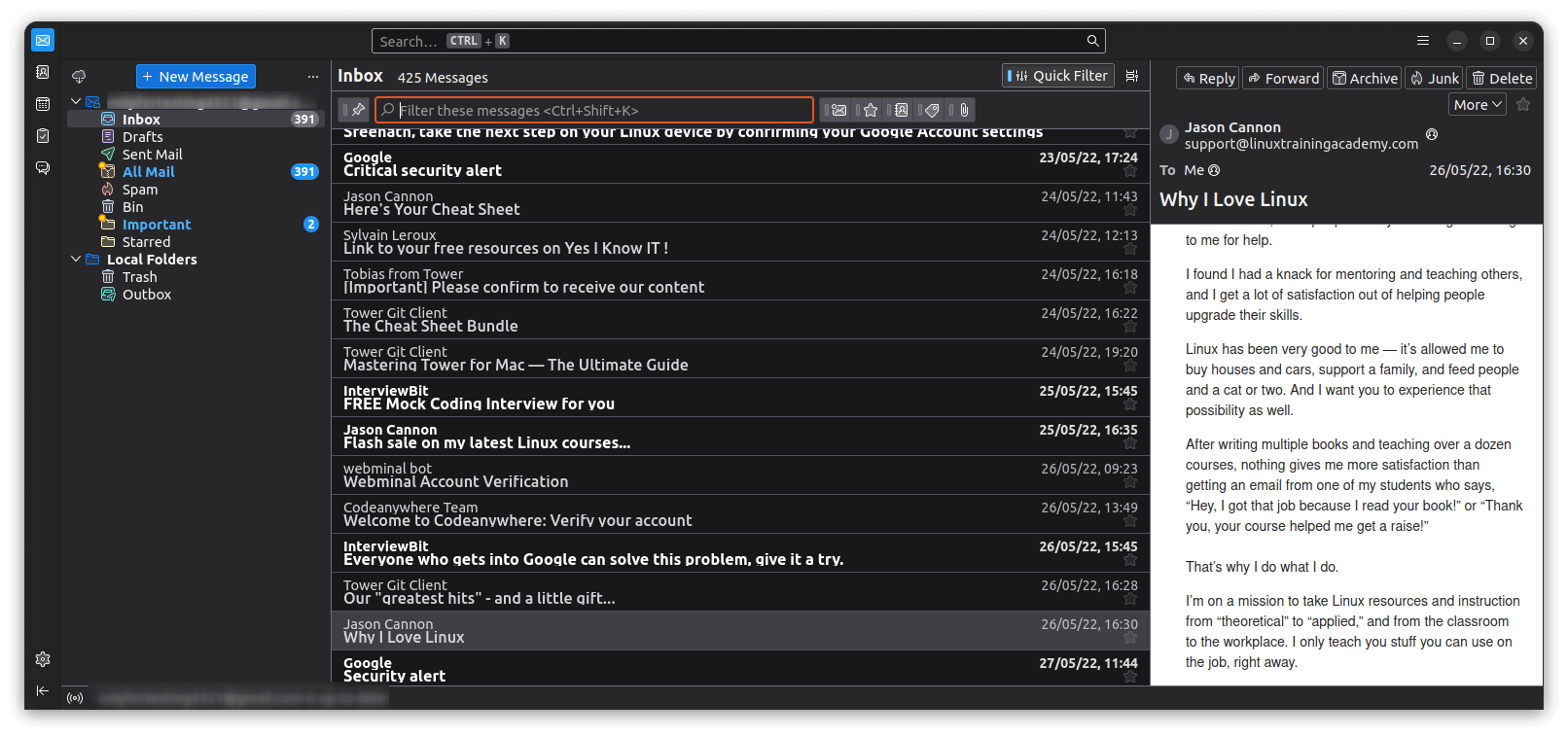
Thunderbird is one of the most popular and oldest open-source email clients. You can find it pre-installed on several Linux distributions.
The user interface has changed a lot over the years, especially with the introduction of Thunderbird 115 and later. Nonetheless, it is a no-nonsense email client with all the essential features.
Key Features:
- Contacts Management with CardDAV support.
- Robust privacy options and phishing protection.
- Add-ons to extend functionalities like the ability to upload large attachments to outside storage providers without leaving Thunderbird
- Customize look/feel with default themes, or customize just like Firefox
- End-to-end encryption setup support
- Chat with IRC and Matrix support
- Spam detection
How to install Thunderbird in Linux?
Thunderbird should be available through your package manager or software center, regardless of what Linux distribution you are using.
In case you’re using Ubuntu, or any Debian-based distribution, you can install it by typing in:
sudo apt install thunderbirdFor other Linux distributions, you can also utilize the Flatpak package available. You can refer to our Flatpak guide for help.
2. Evolution
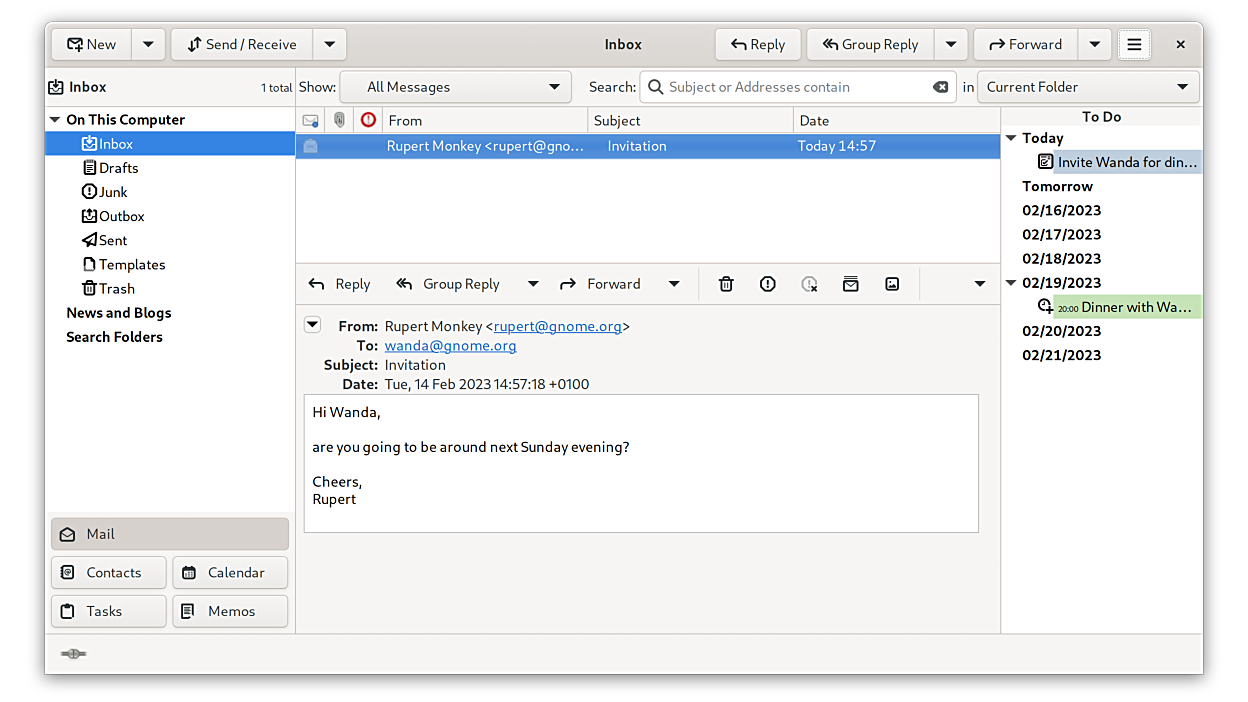
Evolution is an open-source email client by GNOME. It wasn’t as popular as Thunderbird, but, over the years, many Linux distributions have considered replacing Thunderbird with Evolution as the pre-installed email client for a nicer overall user experience.
Key Features:
- Contacts management and calendar integration
- Microsoft Exchange support
- Ability to add memos and manage tasks
- Supports both GPG & S/MIME encryption
- Spam detection
How to install Evolution in Linux?
You can get it right from the software center or through the terminal (for Debian-based distros) by typing in:
sudo apt install evolutionHowever, to get the latest stable version on any Linux distribution, you might want to utilize the available Flatpak package.
3. KMail
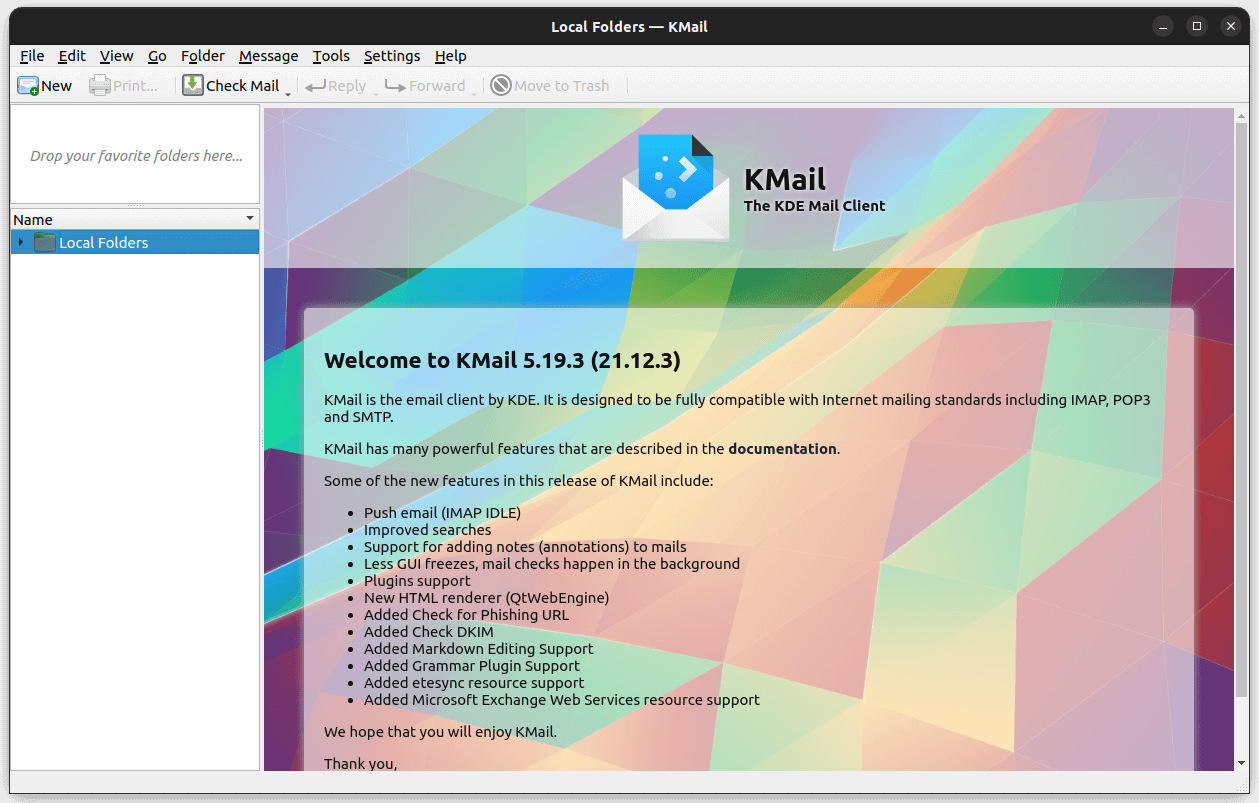
KMail is a part of Kontact, a personal information manager, that was developed for and fits nicely with the KDE environment. It can also be used as a standalone email client on other desktop environments as well.
It does install a few tools like KDE Connect along with some other important packages when you install it on a non-KDE desktop system, so if you do not want those, you can manually remove it.
Key Features:
- KMail integrates nicely with KDE Plasma desktop utilities
- Supports PGP & S/MIME encryption.
- End-to-end encryption support
- Spam detection
How to install KMail in Linux?
On a KDE-powered system, you should find it pre-installed. For Ubuntu-based distros, you can install it using the terminal:
sudo apt install kmailFor other Linux distributions, you can also utilize the Kontact suite available as a Flatpak package and get it installed. This way, you will be able to install KMail along with some essential tools to make the most out of it.
4. SeaMonkey Email
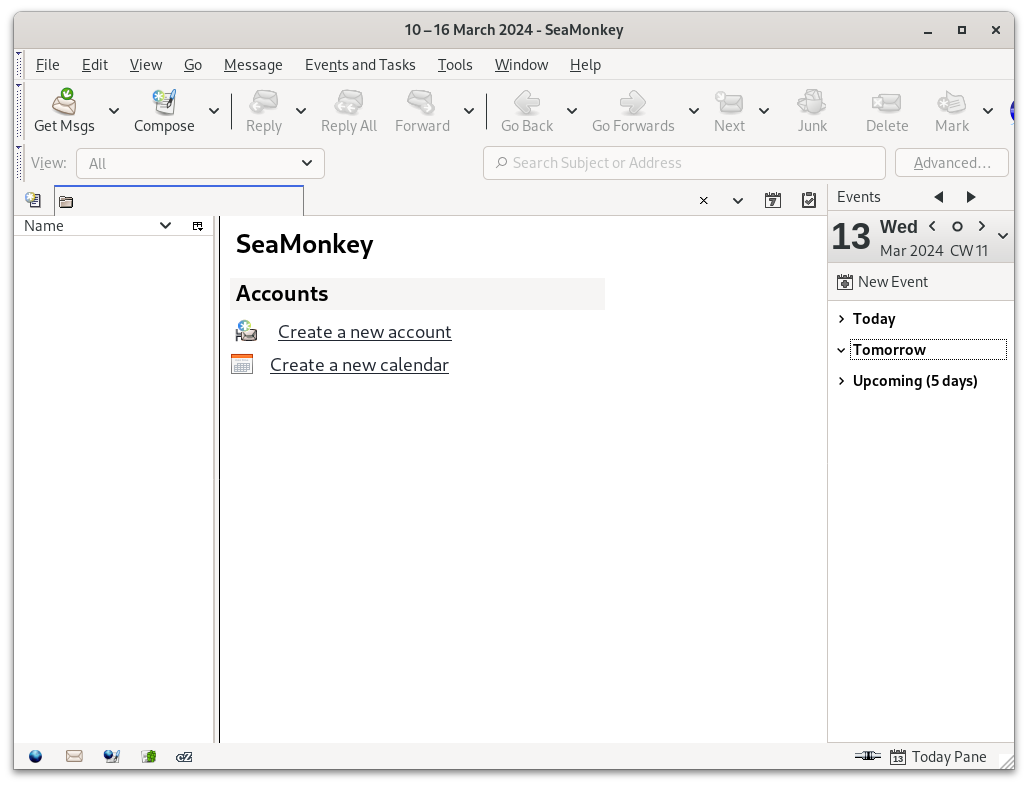
SeaMonkey is an application suite featuring a web browser, email client, feed reader, IRC chat, and web development tools. It is also one of the best lightweight web browsers.
If you are someone who wants a simple, open-source, and an all-in-one solution, SeaMonkey can be a good pick. You can seamlessly use emails, browse the web, and do plenty of things.
SeaMonkey shares a lot of source code from Mozilla Firefox and Thunderbird. So, if you are unhappy with the modern changes to Firefox and Thunderbird, SeaMonkey is for you.
Unlike some GNOME-tailored email clients in our list, SeaMonkey looks/feels the same across different desktop environments and works well.
Key Features:
- An all-in-one utility
- Classic user interface and a clean layout, similar to the old Thunderbird
- Lightweight application suite
How to Install SeaMonkey?
SeaMonkey is not available through the software center or Flathub/Snap. You need to download the compressed archive from its official site, extract it, and run the Linux executable inside the extracted folder.
You can follow the official documentation for more info.
Suggested Read 📖
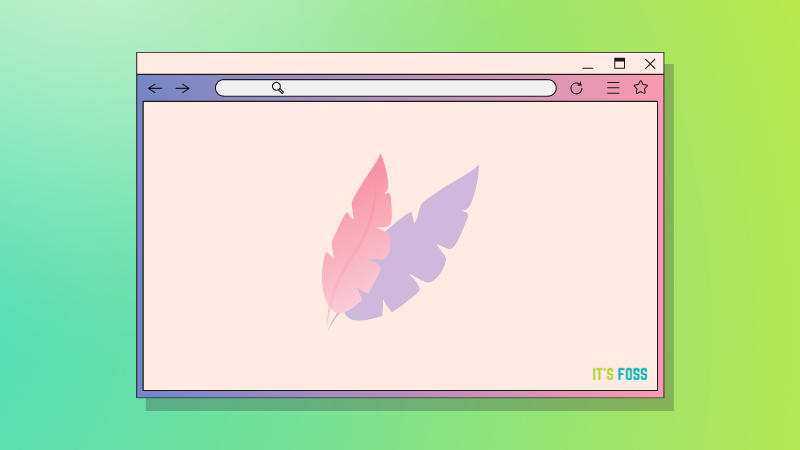
5. Geary
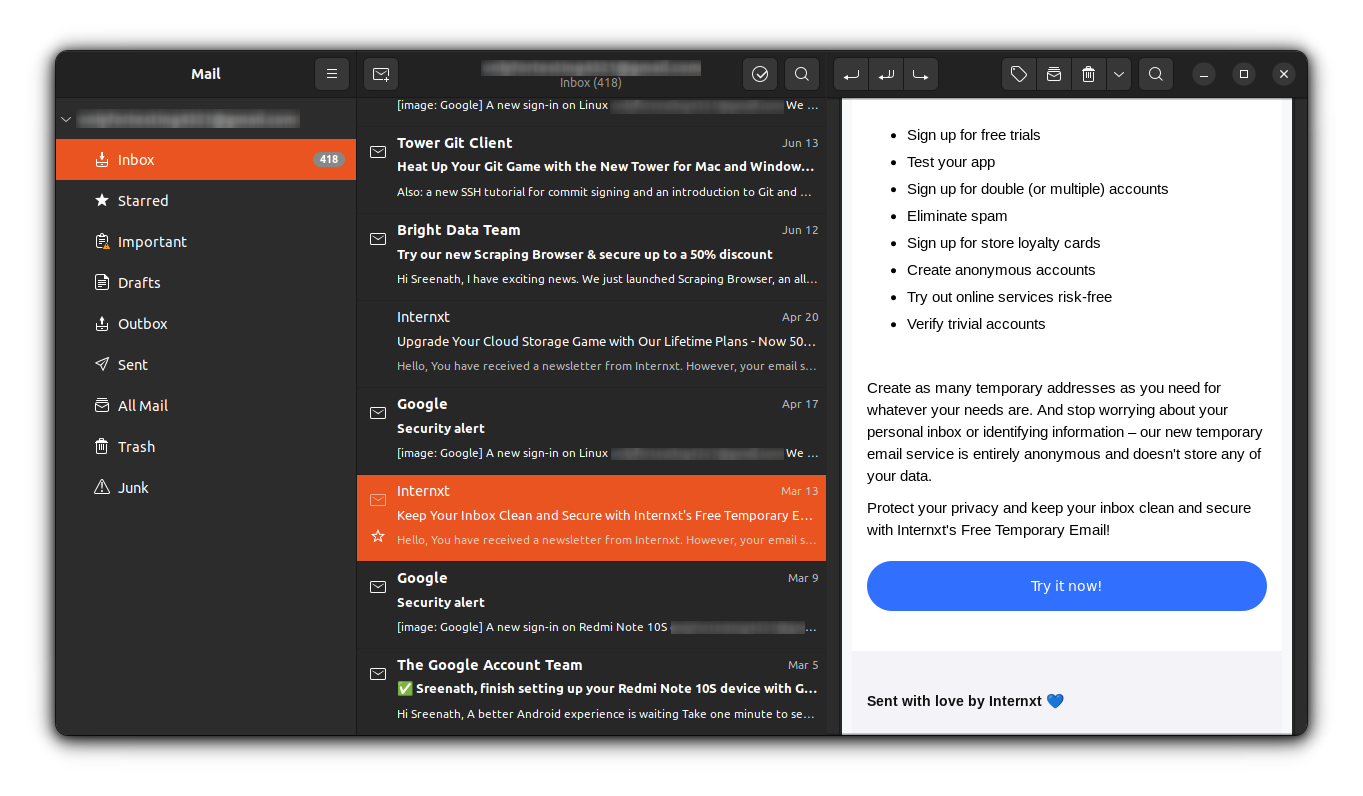
Geary is yet another open-source email client from the GNOME project. It aims to be a simple and fast email client primarily tailored for the GNOME desktop, but you can use it on other desktop environments as well.
Key Features:
- Geary is modern looking and lightweight with a simple user-interface
- Integrates well with the GNOME desktop environment and provides notification for new mail
- It is quite straightforward to set mailboxes with Geary.
How to install Geary in Linux?
You can either build Geary from its source code available on GitLab or install it from the Flathub store.
6. Blue Mail (Non-FOSS)
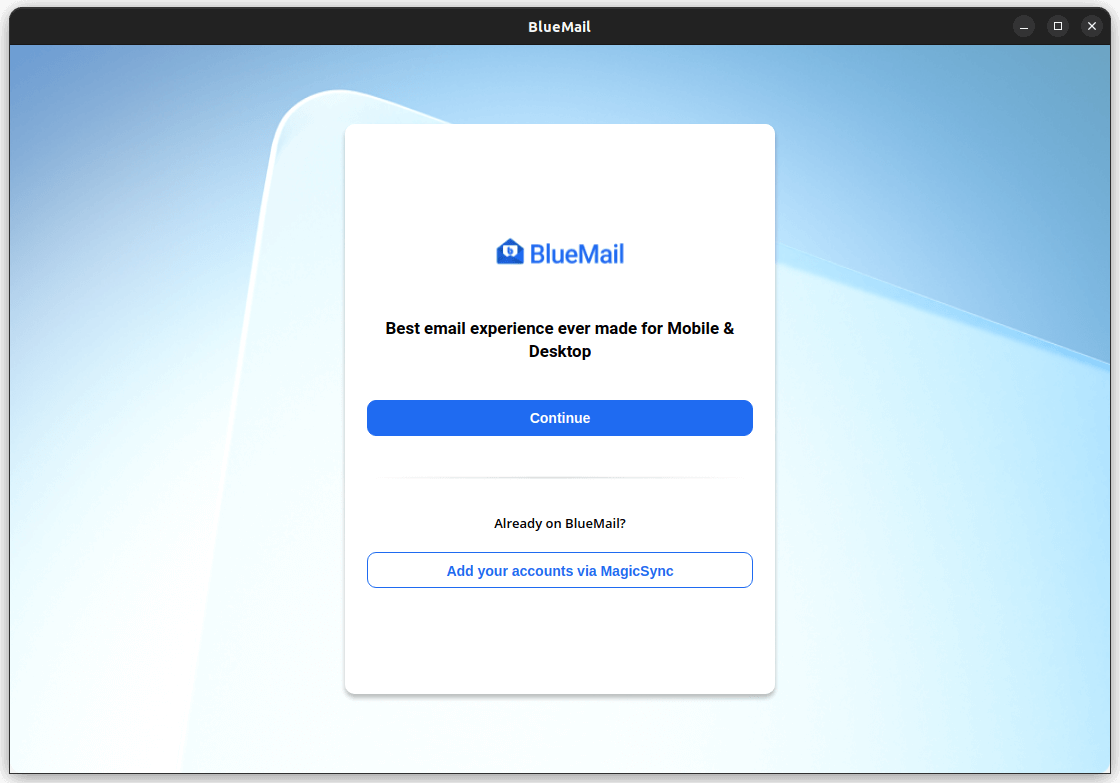
Blue Mail is a proprietary option for Linux users who want a visually appealing email client. It is quite a popular application for Android, and continues its tradition of offering essential features along with some extras for a premium.
For individuals, it is free. But, if you are a business, you will have to opt for the premium pricing plans.
Key Features:
- Group emails
- Unified inbox
- Integrated calendar
- Task board
- ChatGPT-based AI to help you write/summarize emails
- Theme customization (light/dark)
- It supports IMAP, Exchange, ActiveSync, and POP3 protocols
How to Install BlueMail in Linux?
BlueMail is available for Linux as a Snap, DEB package, and RPM package. The snap package should be suitable for every Linux distribution.
You will not find it listed in your software center or the repositories unless you have snap integrated.
7. Claws Mail
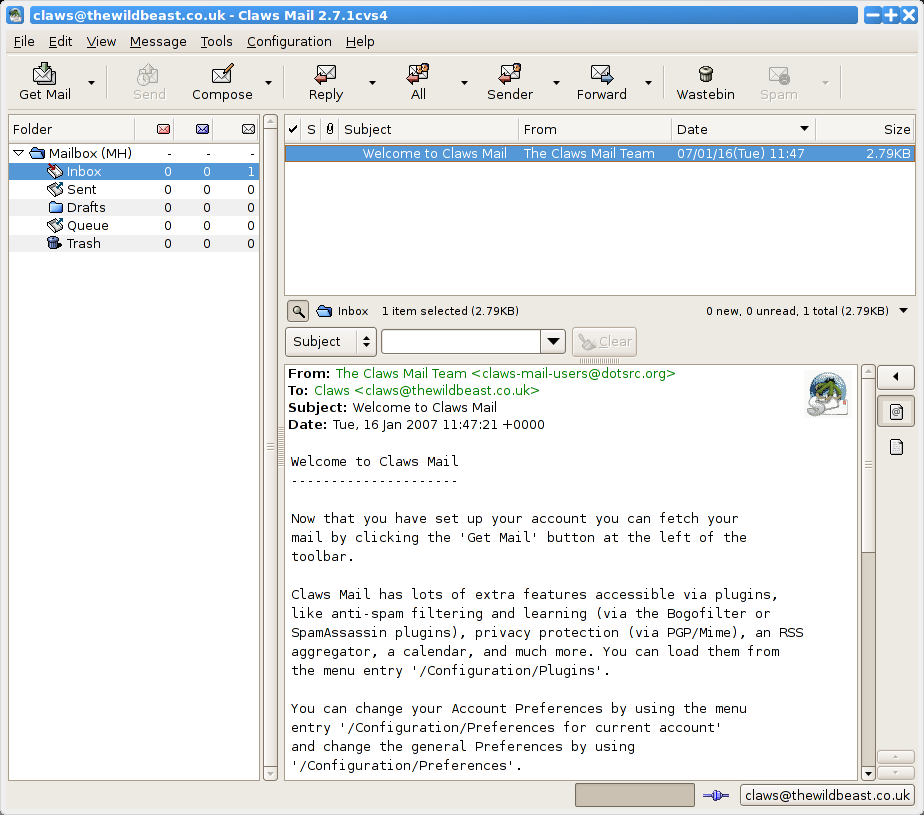
Claws Mail is a lightweight email client using a GTK+ interface that focuses on giving a familiar user experience to popular email clients while providing some extra functionalities like an RSS aggregator.
Key Features:
- Plugins for extensibility
- Lightweight client
How to Install Claws Mail in Linux?
You can head over to the official website to get access to an expansive variety of packages for various Linux distributions.
8. Mutt
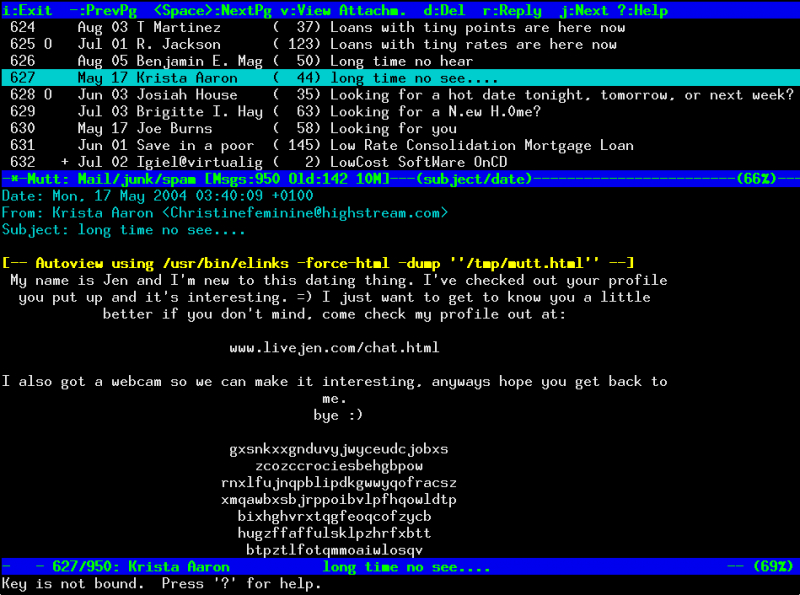
If you are an avid terminal fan, Mutt is just the right text-based email client for you.
Key Features:
- Interface: Mutt runs entirely in your terminal windows with a text-based user-interface.
- Security: It supports PGP and MIME.
- Customization: Highly customizable with keybindings and macros support.
- Searching: Regular Expression support for searching emails.
How to Install Mutt in Linux?
Similar to Claws Mail, you will find a large variety of packages on their official website for various Linux distributions.
9. NeoMutt
If you like Mutt, but want more features, NeoMutt is the option to opt for. The project collected various old patches for Mutt and updated them, and applied it.
Key Features:
- Interface: NeoMutt runs entirely in your terminal windows with a text-based user-interface.
- Security: Self-encrypted email and encryption info status
How to install NeoMutt?
You will find the package in your Linux distribution's repositories, or find a binary for it, including Debian-based systems. For more information, you can visit its distro instructions page.
10. Mailspring
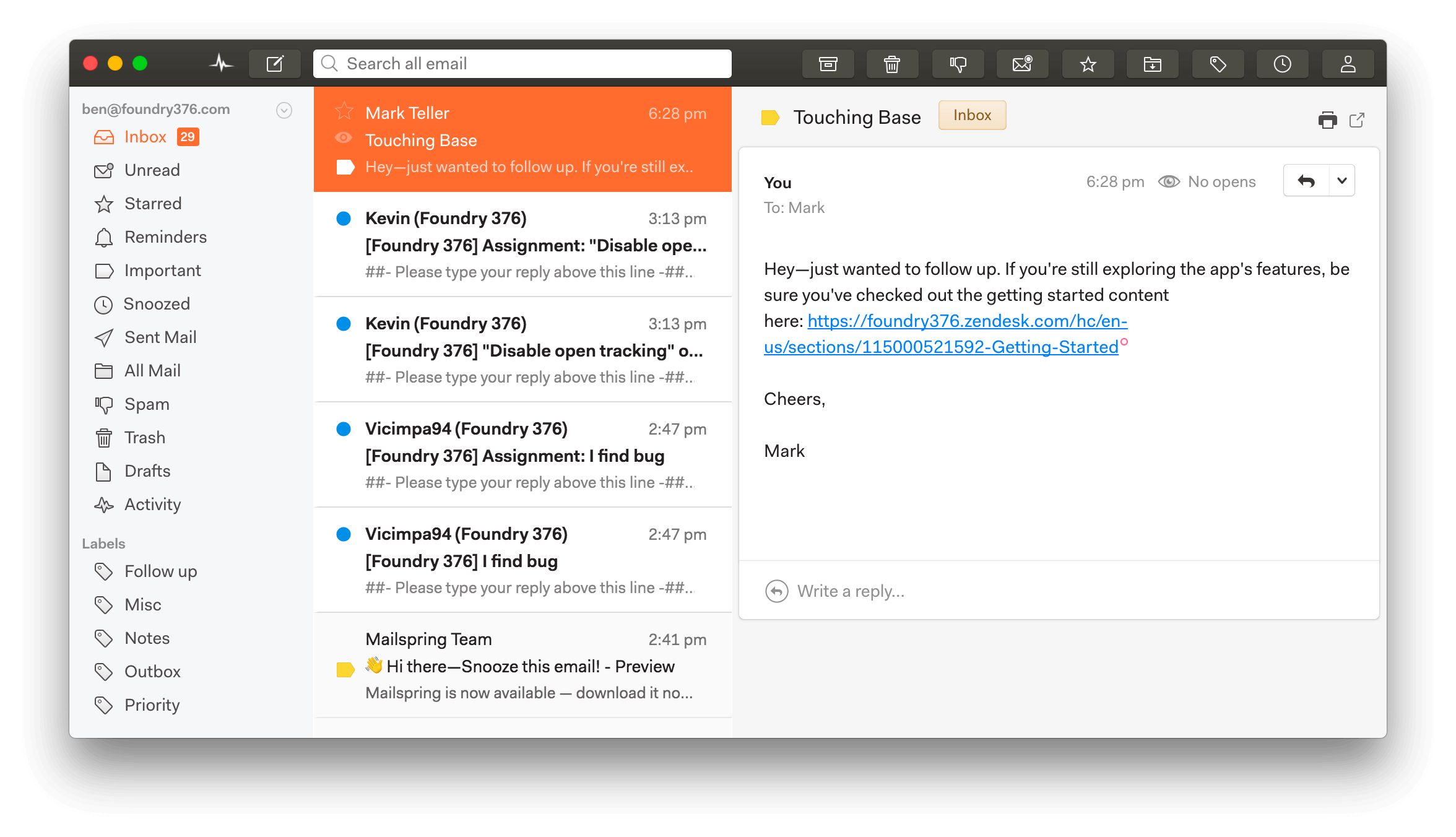
Mailspring, is a next-generation open-source email app built with open web technologies. It has a modern and slick user interface.
Even though it offers many features, most of them are limited to a premium subscription.
Key Features:
- Modern and minimal user interface
- Calendar integration with the essentials and the ability to share your schedule with others
- You can create custom templates for various situations so that you can edit them and send replies quickly.
- You can also track your emails and get read receipts.
All the things above are just things that come out-of-the-box. Mailspring is customizable and extensible to its core. You can customize its look however you see fit by tweaking its CSS stylesheet or extend its features with various extensions available.
Or better yet, if you know JavaScript, you can even build one yourself!
How to Install Mailspring in Linux?
You can either opt for the DEB or RPM packages, or you can opt for the Snap. Head over to the official website to get the package of your choice.
11. Betterbird
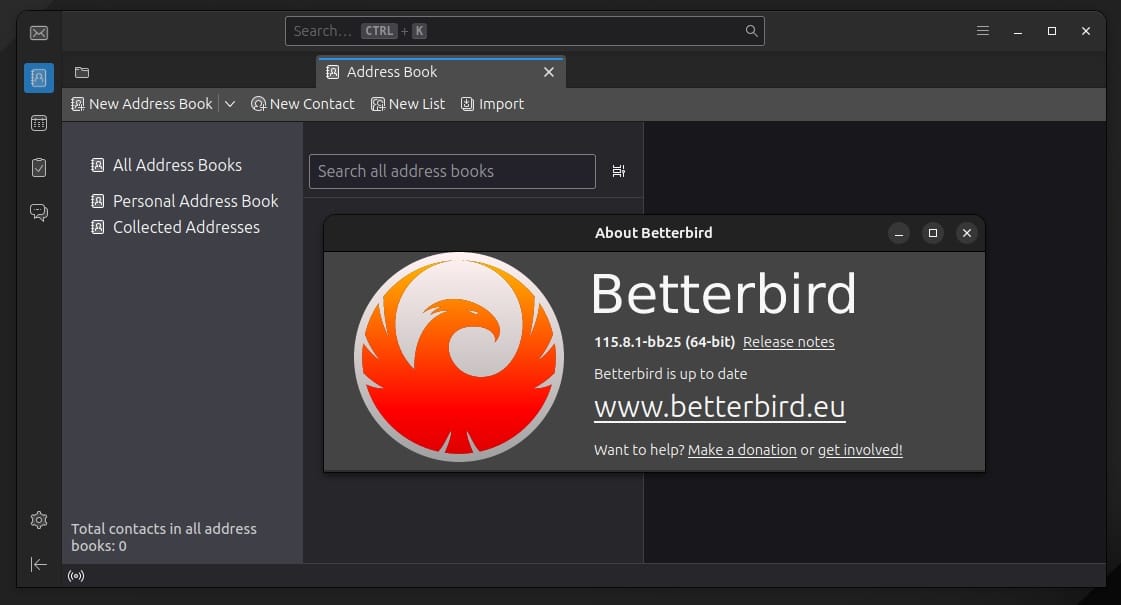
Betterbird is a fork of Thunderbird that aims to be better.
No, it is not a wildly different fork of Thunderbird with new bells and whistles. It is more of a project that wants to keep the traditional features of Thunderbird intact along with the modern fundamental changes.
If you are someone who liked the Thunderbird client before its last major revamp (supernova), Betterbird is for you. They try to add features removed from Thunderbird, and address some issues observed in Thunderbird before it is officially fixed.
Key Features:
- Thunderbird but better (for particular users)
- It may include bug fixes that are originally problematic on Thunderbird
- Brings back features removed from modern Thunderbird
12. Trojitá
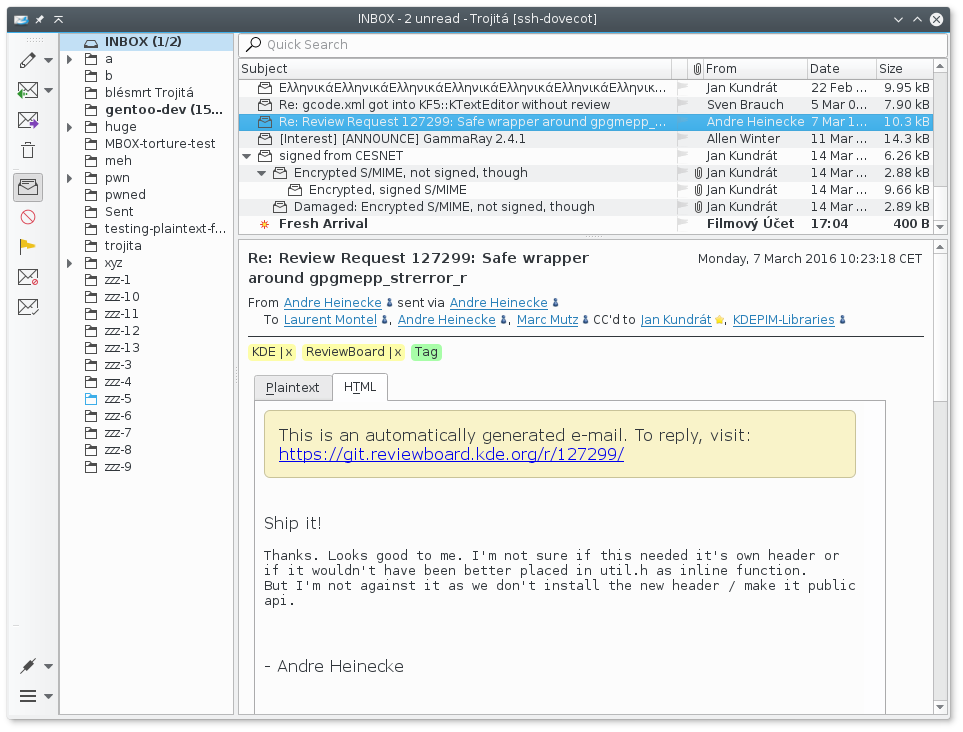
Trojitá is a fast, lightweight IMAP e-mail client built using the Qt framework, designed for efficient handling of large mailboxes.
Developed under the KDE project, it supports features like secure password storage via QtKeychain, optional cryptographic support with GpgME++, and IMAP extensions.
Users can build it from source. While prebuilt binaries are no longer maintained, the client remains actively available via Git and SourceForge for those comfortable compiling it themselves.
Key features:
- Fast and lightweight IMAP e-mail client optimised for performance
- Built with Qt, ensuring cross-platform compatibility and a responsive UI
- Secure password storage via optional QtKeychain integration
Which email client do you think is best for Linux?
Simple, and flexible choices would be the best. For me, those are Evolution, and Thunderbird, no matter what. SeaMonkey is a good replacement if you hate Thunderbird's modern user interface.
Every email client has its special character. If you like it, try it out!
💬 Do you use desktop email clients or prefer the web browser? If you do, which is the best email client for Linux in your opinion?
It's FOSS turns 13! 13 years of helping people use Linux ❤️
And we need your help to go on for 13 more years. Support us with a Plus membership and enjoy an ad-free reading experience and get a Linux eBook for free.
To celebrate 13 years of It's FOSS, we have a lifetime membership option with reduced pricing of just $76. This is valid until 25th June only.
If you ever wanted to appreciate our work with Plus membership but didn't like the recurring subscription, this is your chance 😃


